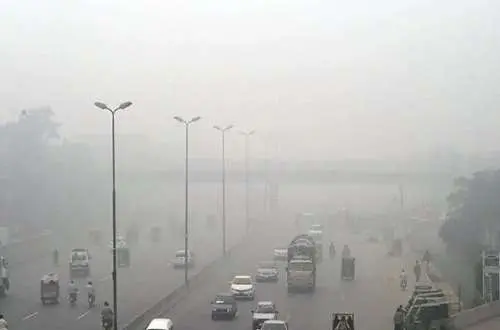By Ghana News
Copyright ghanamma

Environmental Scientist Dr. Frederick Otu-Larbi has revealed that air pollution remains a major health concern in the country, with approximately 28,000 people dying annually from diseases related to poor air quality. The stark figure, shared in a statement on social media, surpasses deaths from malaria and HIV/AIDS combined, positioning air pollution as one of Ghana’s most urgent public health threats.
Dr. Otu-Larbi, who lectures at the University of Energy and Natural Resources, explained that poor air quality is a leading cause of death globally. He noted that 8 million deaths worldwide each year are associated with poor air quality, with Ghana’s estimated 28,000 annual deaths exceeding those from malaria at 23,000 and HIV/AIDS at 15,000.
The environmental scientist emphasized that air pollution stems from both natural and human activities, creating a complex challenge that requires multi-faceted solutions. Natural sources include volcanoes, pollen, wildfires, and gases emitted from trees, while seasonal factors like harmattan dust from the Sahel region contribute significantly to Ghana’s air quality problems.
“During the harmattan season, dust from the Sahel region is carried over to Ghana where it causes air pollution,” Dr. Otu-Larbi clarified. However, human activities represent the more controllable sources of pollution, including cooking with charcoal and firewood, burning fossil fuels in vehicles, and the widespread practice of burning refuse and tyres.
As a consultant with built environment consultancy firm Pss Urbania, Dr. Otu-Larbi participated in research across 13 Metropolitan, Municipal and District Assemblies that revealed pollution levels exceeding accepted safe levels set by the World Health Organisation and the Environmental Protection Agency. The comprehensive study installed air quality monitors at 60 locations to measure key pollutants.
Identified hotspots include Nkrumah Circle, La Maale, Kanda Cluster of Schools, Nima Market, Kotobabi Cluster of Schools, Madina Zongo Junction, Tetteh Quarshie Interchange, and various densely populated locations. The concentration of pollution around schools is particularly alarming, as children are especially vulnerable to the health impacts of poor air quality.
The 28,000 annual deaths linked to air pollution represent a staggering toll on Ghanaian families and communities. These deaths result from various conditions including asthma, lung cancer, cardiovascular diseases, and other respiratory illnesses that develop or worsen due to prolonged exposure to polluted air.
What makes this figure especially concerning is that it surpasses traditionally recognized major health threats. While malaria and HIV/AIDS have received substantial public health attention and funding over decades, air pollution has operated as something of an invisible killer, causing more deaths without generating equivalent public awareness or policy response.
The comparison with malaria is particularly striking. Ghana has invested heavily in malaria prevention and treatment, distributing bed nets, improving diagnostic capabilities, and ensuring access to antimalarial medications. Yet air pollution, which kills an estimated 5,000 more people annually, has not received commensurate attention or resources.
Dr. Otu-Larbi’s revelation comes as part of growing awareness among scientists and public health experts about the severity of Ghana’s air quality crisis. Recent studies, including those by Pss Urbania, have documented pollution levels that consistently exceed WHO guidelines in major urban centers, exposing millions of residents to health risks daily.
The human activities contributing to pollution are deeply embedded in Ghanaian daily life. Cooking with charcoal and firewood remains common in many households due to affordability and accessibility, while vehicle emissions from poorly maintained cars and trucks compound the problem in urban areas. The practice of burning refuse, though illegal, continues in many communities lacking proper waste management services.
Dr. Otu-Larbi expressed optimism that the 13 MMDAs studied will implement the plans they’ve developed to tackle air pollution within their jurisdictions. Based on the evidence gathered, these assemblies have designed initiatives including increased public awareness, prosecution of individuals and businesses causing pollution, regular air quality monitoring, and capacity building for staff on air quality management.
However, translating plans into effective action will require sustained commitment, adequate funding, and political will. Previous environmental initiatives in Ghana have sometimes foundered due to resource constraints or competing priorities, making follow-through crucial for this effort to succeed.
The economic implications of 28,000 annual deaths extend beyond the immediate human tragedy. Lost productivity, healthcare costs, and shortened lifespans represent significant economic burdens that affect families and the nation’s development prospects. Young people dying prematurely from pollution-related diseases never reach their full productive potential.
Addressing air pollution effectively will require changes at multiple levels, from individual household practices to national energy and transportation policies. Transitioning from biomass fuels to cleaner cooking methods, improving vehicle emissions standards, developing proper waste management infrastructure, and reducing industrial emissions all form part of the solution.
Public awareness represents a critical first step. Many Ghanaians may not fully understand how air pollution affects their health or recognize the sources of pollution in their daily activities. Educational campaigns that help people connect the haze over cities to respiratory diseases and cardiovascular problems can motivate behavioral changes.
The concentration of pollution hotspots in densely populated areas and around schools demands urgent intervention. Children breathing polluted air during their developmental years face risks of impaired lung development, reduced cognitive function, and increased susceptibility to respiratory diseases throughout their lives.
Dr. Otu-Larbi’s statement serves as an important wake-up call, quantifying a health crisis that often goes unnoticed because it lacks the dramatic visibility of epidemic diseases. Air pollution kills silently and gradually, making it easy to overlook even as it claims more lives annually than Ghana’s most recognized health threats.
As Ghana continues its development trajectory, balancing economic growth with environmental health will become increasingly critical. The 28,000 annual deaths represent not just statistics but families losing breadwinners, children losing parents, and communities losing productive members to a largely preventable cause.